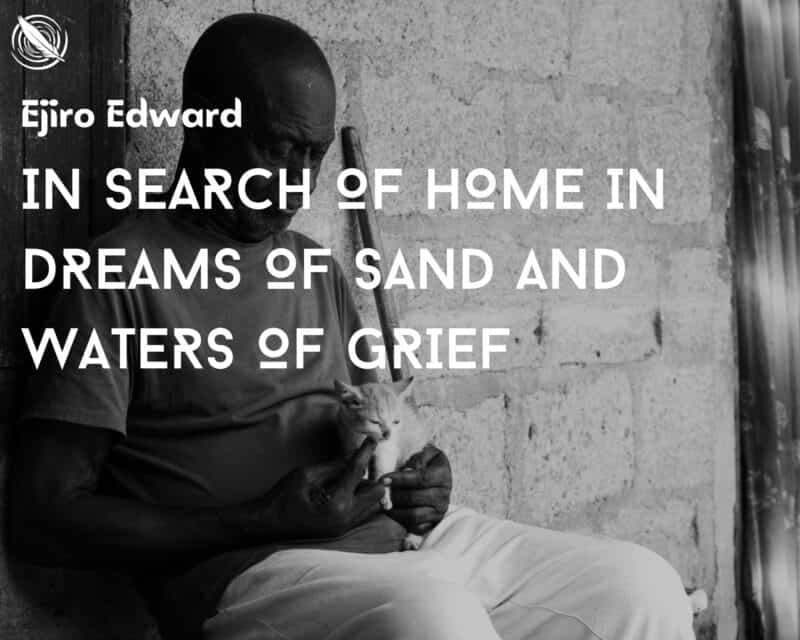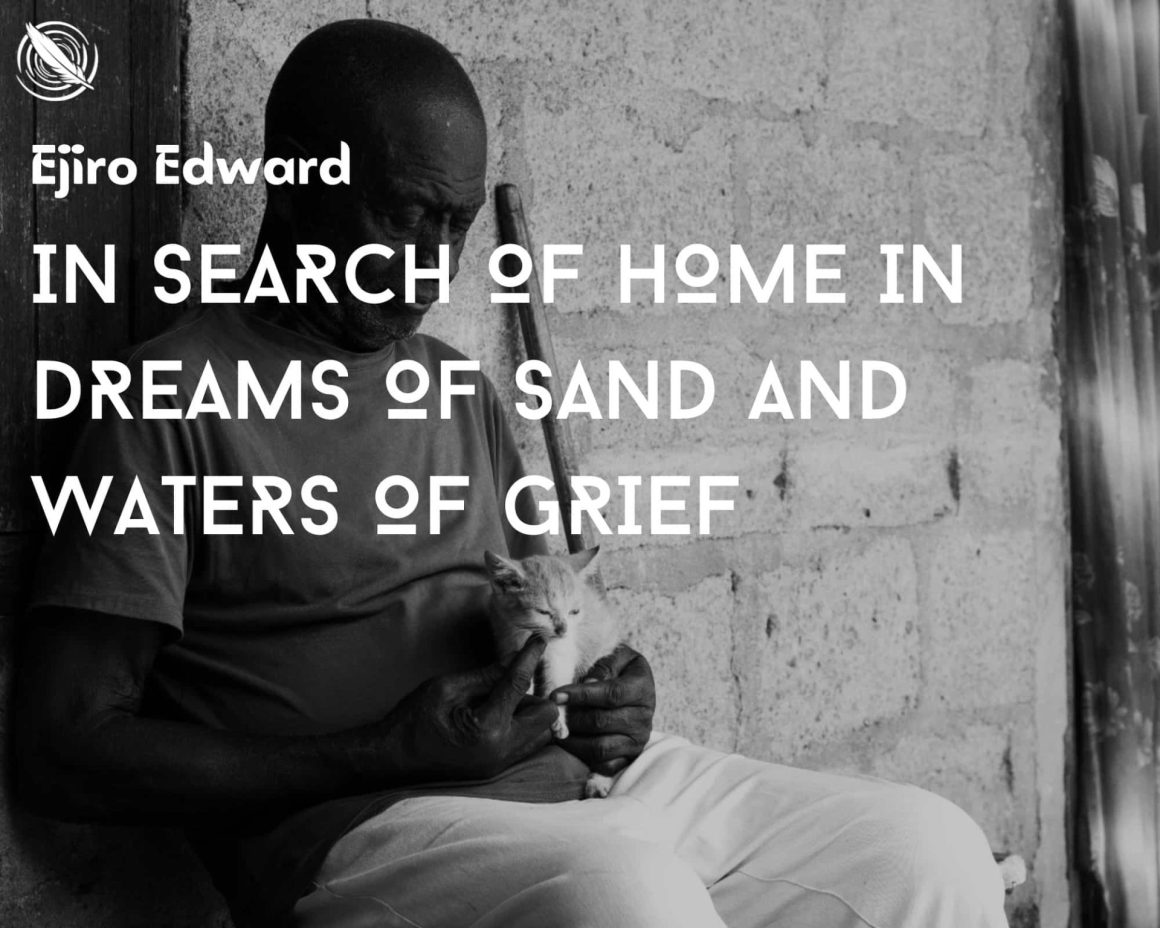
Publisher: Griots Lounge Publishing, Nigeria Year of publication: 2021
“and in leaving/ we seek the unfurling of new wings, the naming/ of new cities, the gift of green rolling hills.”
The Beginning.
What most of us will never know of the Sahara, that gruesome divide stretching across ten countries till it touches the mouth of the Mediterranean, is what we’ve seen in documentaries or gleaned from stories of survivors bold enough to turn their backs on the promise of unfurling of new wings in new worlds, and so does Romeo Oriogun opens his second book, Nomad, with “The Beginning.” Here, he shares with us the intimate moments of travelers at the cusp of a life-changing journey, where before the bus speeds towards the border, he says: “The lady in a blue dress, trembled holding a torn map, and there’s the shifting of trauma through borders where it is in constant “mingling with languages.” We see that for the wandering, leaving is a form of loss too heavy to “leave in a strange park.”
Delivering on several themes with ‘wanderlust’ as a vehicle for his musings, Oriogun animates the Sahara in all her sandy glory within the pages of his book where she teaches on the history of loss—home and dreams, juxtaposed with an abundance of the Atlantic, the Mediterranean, every body of water in the cities where our nomadic companion finds himself.
Through the lyrics, Oriogun reaches into the visceral and reveals his trauma, hinting with the sharp edges of his voice on burning issues: the monstrosity of colonialism, slave trade, human trafficking, and altered documentation of Africa’s history, while sharing his experience of becoming a child of exile driven away from home because of his sexuality.
Since coming into recognition with his Brunel Prize-winning chapbook, Burnt Men, Romeo Oriogun constantly reminds us of the very essence for which we constantly fall in love with every poetry he spins. His showcase of versatility and nuance through language that revels in images and devices is a captivating pastoral beauty and brilliance.
As it is in cultures and religious beliefs, motifs and symbols are recurring in literature. Despite the differences in shape and form as it moves from one writer to another, across timelines and geography, however inspired, every piece of literature is ultimately a universal treatise on truth. Having established this position, it is no coincidence that Nomad is indeed a cornucopia of influences. In one of his interviews, Oriogun shares that the collection of seventy-four poems is the fruit of a four-year dedication to reading and research. One of his influences is Tade Ipadeola’s The Sahara Testament. With its looming imagery of the Sahara as a wasteland of dreams, its metaphor is not lost on some of Oriogun’s poems starting in “Someday the Desert Will Sing,” and reaching into other poems like “The Birds are Moving to Timgad,” “Migrant at the Sahara” and “A Train Stop in the Sahara.”
Oriogun brings forth the issue of migration into focus as he narrates the ordeal of his journey; stopping from one city to another, distinctly describing the man who engages in the illegal movement of people across borders in the poem “Cotonou.” The man he describes is only concerned about his monetary gain, and when he asks him if he feels shame, the man responds: “I desire beauty, in its pursuit there is no end, only ruthlessness.” This brings to mind what happens to those who do not make it to their promised land and are forced to live in brothels or work under hostile conditions in countries like Libya and by implication the pillage of West Africa by Europe. Oriogun indicts the British Royal Trading Company in “Salute from the Boston Cold” as a profiteer of the “shrines of his birth,” exemplifying how ancestral artifacts of the Bini people still lie in show-glasses across Europe.
As Nomad centers its gaze on colonialism, it does not forget the horrors of the Nigerian-Biafran civil war in poems like “Under the Mango Tree,” where he says: “I saw trees that grew/ from skeletons…/ skeletons who were boys made to walk through villages/ and markets blind – their bodies learning an ear could hear/ a road,” and “Remembrance,” where he further explains that “the year running/ back to 1967 when men clad in white were killed/ like sacrificial doves while their mouths/ chanted one Nigeria.”
These lines detail in dreadful clarity the gruesome atrocities of the Nigerian Army against the Igbos of Eastern Nigeria who were agitating for their independent sovereignty. The graphic quote from Ben Okafor’s 2012 BBC interview prefacing “Under the Mango Tree” — “the boys had their eyes plucked out and were sent back to Biafra” — shows that Oriogun writes not just as a literary artist but as a scribe deeply invested in the turbulent histories of Nigeria as it shapes the present.
Similarly, “The Revolution is Over” reignites the tragedy of 20th October 2020, when at about 6:50 p.m., soldiers of the Nigerian Army shot into the crowd of End SARS protesters at the Lekki toll gate in Lagos. Amnesty International, ,in its report, stated that at least 12 protesters were killed during the shooting which the Nigerian Government has refused to acknowledge. Oriogun calls for justice, saying, “There will be no mountain between us… our leader who slept/ as the army rolled into Lagos, killing those/ who woke the night in protest.”
In “Postcard From Abandoned Places,” Oriogun writes about Zacharias Lewala in the second installment “For Lewala, the Discoverer of Light”, where he describes him asthe ‘discoverer of light.’ What we see is the poet interrogating history and its role in the erasure of truth. “What else was taken from us,” he asks, “why is the 1897 British Punitive Expedition in Benin not called what it was: a massacre, for which no one is yet to be held accountable? In “Waiting for Rain,” he says of the statues that are found in Ring Road, close to the Oba’s palace in Benin, that it descends with the old smell of gunpowder and the wind sweeps its uselessness into history.
Romeo, through Nomad, retells the history of his ancestors as his. He questions what is said about our unconscious being, the cumulation of shared experiences, of which the individual is not aware. He questions the grief coursing through his body which might not be an attribution of a present loss, but rather one that comes to him through inheritance of what has been done to his ancestors.
In “King Jaja,” the poet muses, “What is the unspoken part of exile?” Here, Oriogun assumes the dual vestige of the prophet and witness, claiming that, like King Jaja of Opobo, he, too, “will die in exile.” But he goes on to raise a consolatory glass in the hope that the silences of the country speak through his mouth.
In “A Phone Call from Exile,” the poet goes grim with guilt, and shame even, as he performs the act of witnessing with his craft, exemplifying how different his life is from those with whom he walked the road to exile. See how he says, “I, who is ashamed of my comfort,/ does not answer (the phone call). Weeping/ into plants, I ask, does exile equal guilt and in extension?” It is hard to tell when in the opening line of “Salute from the Boston Cold,” he says, “Thinking of my beloved city,/ I watched a flock of birds leave.” Perhaps, it is this inadequacy, this odyssey of the human memory that renders the poem as a true reflection of human frailty.
Also, in “Mist,” we learn that the city of the poet’s birth has turned its back on him, and he like “swallows, searched/ for rooms in the brief wonder of flight.” For the exiled persona, ‘rooms’ become an available construct to shelf his old soul (as if) falling into the slow embrace of pity.
The poet shares some parts of his life with the readers. He lets us into the death of his mother, how he had to wash her corpse and, in the process, became a man.
Romeo Oriogun’s Nomad is living proof that poetry is a biological endeavour and that it can be both personal and political. We can render the smallest parts of our lives in song and language rich with dreams like the sands of the Sahara. We can reach for redemption like the waters of the Atlantic.
The water knows all. It is a delight to see Oriogun re-echo this knowledge through the titular poem, “Nomad,” where he says, “every water I speak to know my soul.” Every drop of water is kindled with memory, like the Atlantic with its voices.” The persona is a child of the water acknowledging that “Every river is a journey,” and what else can he do if not to go “along, a pebble skipping through water” as the final act of the nomad’s life reflected in small ripples of dreams.
For the nomad, with a horde of questions reeling in his bones, there are questions he might want to ask as he starts his journey: what part of myself, name and/or history do I leave at the border? Which part soars across the ocean on the wings of an albatross? ‘Journey’ in the poem is a metaphor for our shared undertakings as humans. Nomad is an outstanding collection of history and one man’s dive into what it means to be a body removed from home while the thirst cripples his tongue.
The collection shows what it means to be inspired by the truths of both the living and dead, to transcend the personal, and to curate a body of literature that is catholic in its ideals and individual in its appeal. And like the Bible, every nomad should own a copy.

Ejiro Edward
is the director of Benin Arts and Book Festival (BAABFEST). She is the assistant editor at Malimbe Inflight Magazine. She has won a couple of literary awards and has been published across several magazines. Her quest for knowledge has led her to her current job as an administrative intern at Book Buzz Foundation. She is enthusiastic, caring and fun.

